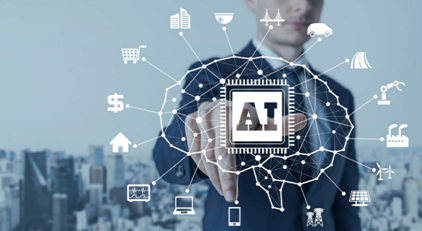Artificial intelligence (AI) is wide-ranging branch of computer science concerned with building smart machines capable of performing tasks that typically require human intelligence. AI is an interdisciplinary science with multiple approaches, but advancements in machine learning and deep learning are creating a paradigm shift in virtually every sector of the tech industry. Norvig and Russell go on to explore four different approaches that have historically defined the field of AI:
- Thinking humanly
- Thinking rationally
- Acting humanly
- Acting rationally
The first two ideas concern thought processes and reasoning, while the others deal with the behavior.
Humanity has witnessed three previous industrial revolutions: first steam/water power, next electricity and then computing. Now, we’re in the emerging of a fourth industrial revolution, driven by Artificial Intelligence and Big Data. This fourth industrial revolution, Industry 4.0 or the Intelligence Revolution is going to transform the world, just as the three industrial revolutions did. This is called “Artificial Intelligence Revolution”.
The ability to think and act in a way that previously only humans can do was given to Machines by Artificial Intelligence. This means they can interpret the world around them, digest and learn from information, make decisions based on what they’ve learned, and then take appropriate action without human intervention. It’s this ability to learn from and act upon data that is so critical to the Intelligence Revolution, especially when you consider the sheer volume of data that surrounds us today. In order to learn and make smart decisions, AI needs data, and a lot of it. This gives us a hint as to why the Intelligence Revolution is happening now.

The idea of creating intelligent machines has been around for decades. But we have more data now than ever before. Everything we do (both in the online world and the offline world) creates data. We now have access to more data than before, which means AI has been able to grow much smarter, faster, and more accurate in a very short span of time. The more data to access, the faster the machines can learn and the more accurately they become at interpreting the information. That is why AI is transformative. A simple example is Spotify.
Another reason is that impressive leaps in computing power make it possible to process and make sense of all that data. We now have the ability to store, process and analyze data on an unprecedented scale using cloud computing and distributed computing. Without this, data would be worthless and can’t be stored and accessed.
Every business is going to have to get smarter from small startups to global corporations, from digital native companies to more traditional businesses. Organizations of all shapes and sizes will be impacted by the Intelligence Revolution. For example, take Farming. Agriculture is undergoing huge changes, in which technology is being used to intelligently plan what crops to plant, where and when, in order to maximize harvests and run more efficient farms. Data and AI can help farmers monitor soil and weather conditions, and the health of crops. Data is even being gathered from farming equipment, in order to improve the efficiency of machine maintenance.This is the impact of the Intelligence Revolution. All industries are evolving rapidly. Innovation and change is the new norm. Those who can’t harness AI and data to improve their business – whatever the business – will struggle to compete.
As in each of the previous industrial revolutions, the Intelligence Revolution will utterly transform the way we do business.AI is going to impact businesses of all shapes and sizes, across all industries. For your company, this may mean you have to rethink the way you create products and bring them to market, rethink your service offering, rethink your everyday business processes, or perhaps even rethink your entire business model. If you have any plans to Enter into this revolutionary field let’s master this Artificial Intelligence course





Be the first to comment on "Artificial Intelligence Revolution in Businesses"